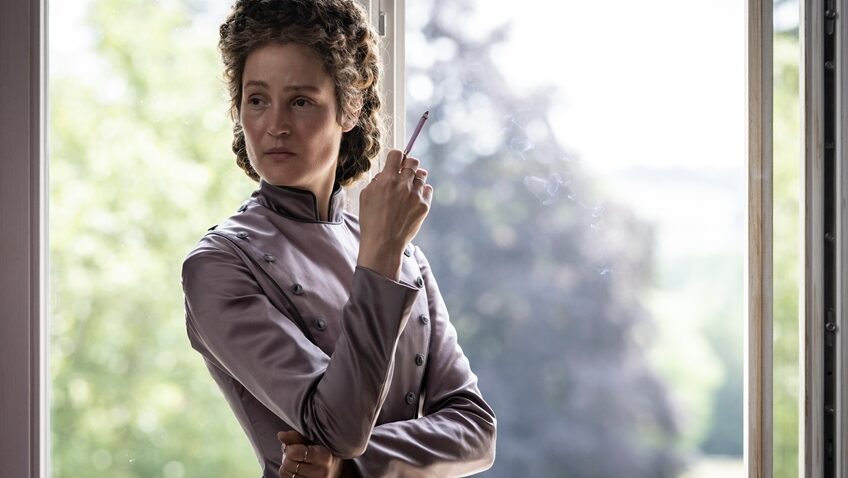Joyce Glasser reviews Corsage (December 26, 2022) Cert 15, 114 mins.
As a doctor prescribes her daily doses of heroin, he reminds Empress Elisabeth of Austria-Hungry (Vicky Krieps) that the average life span of her female subjects is 40. But if a 40-year-old Empress, known for her beauty, fashion and figure, can become the proverbial invisible woman, what can she do to fight against obscurity and irrelevance? This is the question that preoccupies both Empress Elisabeth and Austrian writer-director Marie Kreutzer in her inventive, subversive, reproachfully feminist biopic that will catapult Krieps, if not Kreutzer, to the international limelight.
As for Empress Elisabeth, her story has been told in many forms over the years; most memorably in the 1950’s German-language Sissi trilogy starring Romy Schneider. Previous films contrast the carefree, outgoing, Duchess of Bavaria with the unhappily constricted Empress following her marriage to Emperor Franz Joseph I of Austria (Florian Teichtmeister) when he was 22 and she was 16.
But Corsage, a post #MeToo Movement film, has the distinction of crawling inside the head of an Empress who is also a three-dimensional woman struggling to maintain her dignity in a moribund marriage and suffocated by her rank, society and gender. She feels estranged from her judgmental, by-the-book, young daughter, Valerie (Rosa Hajjaj) and concerned for her directionless son Prince Rudolf (Aaron Friesz) who is outspoken in his view that “the monarchy is in decline,” although his father blames Elisabeth for their son’s rebellious views.

Krieps’ barely needs dialogue: her face and body language express the disappointments, frustrations, indignities and the claustrophobia in her life so dramatically and viscerally that you feel like a peeping Tom. To help us imagine the frustration of a modern mind locked in an historic prison, Kreutzer uses anachronisms, including a soundtrack that includes Help Me Make It Through The Night (written by Kris Kristofferson) and the Rolling Stones’ As Tears Go By.
The film opens in December 1877 in Vienna when two maids hover over the Empress (in a nightshirt, as was the custom) holding her breath under water in the bathtub. After the bath they measure her waist, but Elisabeth calls for the one dresser who can get her corsage (from the French for bodice or girdle) even tighter.
The corsage is a metaphor for the constricting, suffocating and artificial life of Empress Elisabeth, but it’s not just Krieps’ German accent that makes her a natural for this role. In Phantom Thread she was terrific as an intrepid waitress subjugated to a wealthy, famous man for whom she is no more than a new mannequin – until she designs her own liberation. In Corsage, that’s what Krieps and Kreutzer are doing for Elisabeth, even if it means playing with chronology and, a big mistake, making her the agent of her own death, rather than the random victim of a senseless murder.
After sipping soup for lunch, Elisabeth makes a rare appearance with the Emperor at the opening of the new art museum in the presence of the mayor and Prince Adolf of Auersperg. We hear an aid briefing her about the Prince’s criticism of the double monarchy and Elisabeth’s predilection for spending time in Hungary. But when she begins to shake the first of many hands, she faints – whether from starvation, the tight girdle or to avoid being paraded around all day, we never know.
This historical context is complex and while Kreutzer supplies some date/location captions, Elisabeth’s travels, and her relationship with characters including “mad” King Ludwig II of Bavaria (Manuel Rubey) and Gyula Andrássyor (Tamás Lengyel) are glossed over. Auersperg’s criticism of the double monarchy and Elisabeth’s increasing affinity with, and popularity in Hungary where she found respite from the court in Vienna, caused friction in Austria but is never explained or dramatised.
Elisabeth and Franz Joseph’s first daughter, Sophie is mentioned, but not the fact that Franz Joseph’s tyrannical mother, Sophie, insisted on bringing up her granddaughter although the child’s death is tacitly blamed on Elisabeth. That the marriage was poisoned early on by the Emperor’s controlling mother is relevant to the theme, but not mentioned or dramatised. This is a film about turning 40.
What Kreutzer does so brilliantly is show Elisabeth’s two distinct sides: her private self and her formal persona. While the Empress is almost silent, retired, frail and sedentary in public, in private we see her galloping on horseback, joking, fencing, doing gymnastics and engaging in intellectual, political conversations – or trying to. The activity might have been for weight loss, but Elisabeth appears to enjoy physical activity.
She is known to have stayed up late at night reading, but Kreutzer goes one step further, and, to suggest her interest in modern technological advances, invents a meeting with an early inventor of motion pictures who captures her on film. This is more puzzling than instructive, but it’s preferable to a misjudged shot where she abruptly walks out of a formal dinner, giving the finger to the astonished guests.

In public Elisabeth tells a court painter to copy images of her youthful beauty from earlier portraits. Her attempts at seducing her husband fail and although he already has a mistress, there is a strange scene where she engages a mistress for him.
You cannot help but compare Elisabeth with Princess Diana, in her unhappiness, her eating disorders, and her beauty and fashion sense. Both women were tall – 5’ 8 and 5’10, respectively, but Elisabeth kept herself emaciated, weighing only 49 kg. And both women used their royal status to make a difference the fields of war and health.
We see Elisabeth visiting mental hospitals (for which she introduced hot baths for the patients). In one women’s ward, she is both attracted and repelled by a woman’s agony, and, as though fearing for her own future, asks the male doctor for an explanation. “Adultery,” he replies, and we must assume her illness is punishment for her adultery, not the result of syphilis from her husband’s. She also visits a military hospital and stops to chat with an amputee soldier who asks her for a cigarette. She astonishes everyone when she gives him one of her cigarettes and then lies down next to the soldier to enjoy her own cigarette.
Afterward, Valerie rebukes her for smoking in public. Franz Joseph is patronising in his praise for her charitable visit, but when she wants to discuss the war and the situation in Sarajevo seriously, he dismisses her. She can’t win and Kreutzer’s attempt to give her agency over her death might, ironically, confirm that sad truth.




